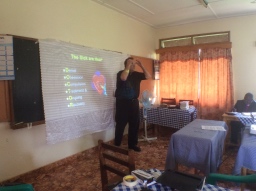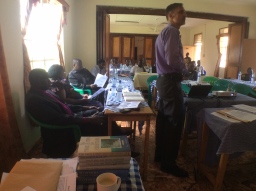Friday, April 17
Jay did indeed get in on time, and the Kampala team meets us at the airport. We get in at 4 pm on Thursday, eat dinner, change cars, and head directly to Soroti. First, we have to get out of the capital.
Driving in Kampala is a near-death experience, even under the best of conditions. At rush hour it reminds you of what someone once said about war: hours of boredom punctuated by moments of terror. You can sit in a traffic jam for what seems like days. Fortunately, Solomon knows the city like his own hand, and is possibly the most skilful driver I have ever met. He takes us off the main road through a tangle of alleys, dirt paths, and narrow streets. We go up and down hills, in and out of neighborhoods, and barely an hour later are clear of the congestion of this city of six million. His driving defies both law and physics, but I am happy for it.
The road to Soroti is much improved; most of the 362 kilometers are smooth going, slow in places because of the constant flow of trucks heading to the Sudan, but things only get a little rough on the last leg from Mbale. We arrive in Soroti at 1:30 in the morning, and are settled in by Pilgrim’s wonderful staff at the comfortable house of our founder, Calvin Echodu. We are up early, arriving at Saint Peter’s Cathedral to begin the conference we are leading: Alcohol Addiction and the Churches.

Some of our class
This is the second training. Jay Geisler and I introduced the subject last summer in the course of two brief seminars. This 2-day conference is in response to multiple requests for further help. We are enormously grateful for the third member of our team, Dr. Mark Guy, a family practitioner with Allegheny Health System who has extensive experience in addiction, medical treatment of severe alcoholism, detox protocols, and the like. A major goal of our involvement is to establish an AA-centered approach to recovery, based on the understanding that addiction is an illness, not a moral failing. Mark will be hugely important in this effort.
We are expecting 25 strategically chosen clergy, social workers, and elders. When we arrive at about 9:15 a.m. there are only three or four present. I feel my heart sink..
Of course, I am forgetting: this is Africa!

Jay gives the ABC’s of Addiction
Over the next half-hour the room fills, including the Bishop of Soroti, George Erwau, and his wife Florence, who will remain with us for the entire day. This is a measure of the significance of alcohol abuse in this region, and as we move through lively opening singing and prayers, into introductions of the participants, Bishop George disclose personal reasons for being there as well: family members he saw ruined by adiction while he was growing up. Many others have similar stories. It is clear this is not merely an abstract problem.

Dr. Guy at Work
We have structured the first day as an intense dose of information, a morning of bad news followed by an afternoon of Good News: I lead with a Biblical exploration of the spiritual roots of addiction in idolatry. Jay does the ABC’s of alcoholism– how it begins, what alcoholic behavior looks like, why it is best seen as an illness. Mark gives a thorough descrition of the physiology of addiction, the symptoms and progress of the disease, and exactly how it kills. Participants make extensive notes, ask pointed questions, pay careful attention. By mid-day, the atmosphere in the room is, um, sober.

Bishop makes a Point
After lunch, we move into the Good News: I talk about God’s curing the soul through gracious love, what the Church looks like when this becomes a reality. Jay opens up the twelve steps through the lens of the Beatitudes in Matthew 5.Mark focusses on successful treatment of withdrawal and the crucial role played by family and social supports..The afternoon ends with an animated question and answer session.
Returning home we find a feast:: Pilgrim staff greeting us and James our wonderful cook having prepared a magnificent spread of roast goat ((my personal favorite), pork and chicken.. We try to retire early.. Good luck with that!
